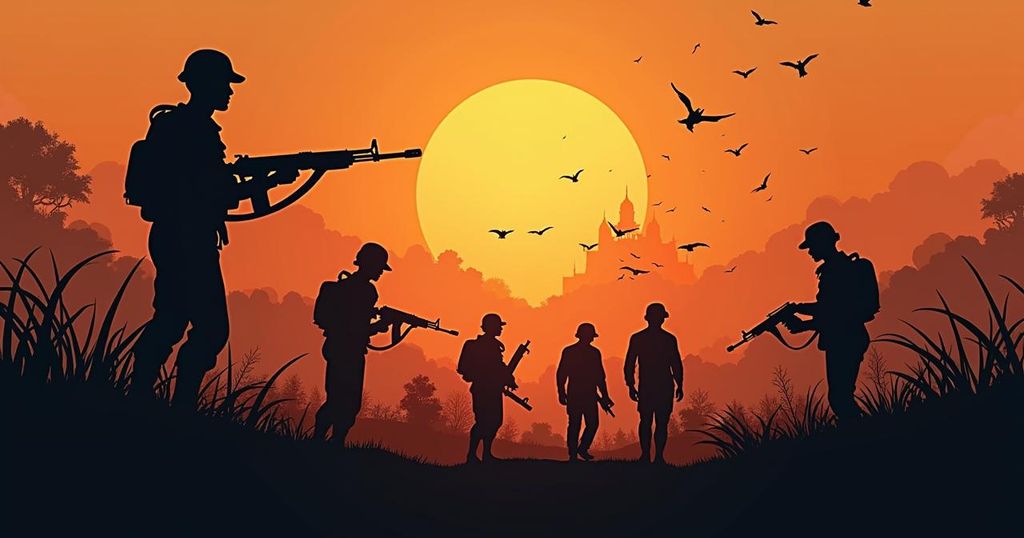Myanmar Rebels Reject Junta’s Peace Offer Amid Ongoing Civil Strife
Rebel factions in Myanmar have decisively rebuffed a peace initiative from the military junta, which is grappling with significant territorial losses in the ongoing civil war. This outreach represents the junta’s initial attempt to engage in political dialogue since its 2021 coup, coinciding with a failed ceasefire orchestrated by China. Nevertheless, armed groups express deep skepticism regarding the junta’s intentions, demanding accountability for past crimes and the establishment of a federal democratic framework before negotiations can commence.
In a significant setback for the ruling junta in Myanmar, various rebel groups have outrightly dismissed a recent peace initiative presented by the military regime, which has been under increasing pressure from civil unrest and territorial losses over the past three years of conflict. This outreach marks the first communication of its kind from the junta since its military takeover in 2021 and comes on the heels of a broken ceasefire facilitated by China in the northern Shan state. The junta’s proposal included an appeal to ethnic armed factions and groups deemed “terrorist insurgents” to engage in political dialogue to resolve ongoing issues, along with an invitation to participate in elections scheduled for the following year. However, the exiled National Unity Government (NUG) quickly rejected the overture, arguing that the junta lacks the legitimacy to conduct elections. Facing intense military opposition and declining territorial control—reportedly possessing less than half of the country—the junta’s peace offer appears to be a desperate measure to stave off escalating rebellion. Notably, an alliance of three ethnic armies has intensified their offensive since June, capturing strategic territory that disrupts trade routes to China, highlighting the significance of this conflict for regional stability. Wang Yi, China’s chief diplomat, reportedly conveyed a stern warning to Min Aung Hlaing, the junta leader, during his previous visit, emphasizing the paramount need for armed groups to adopt a peaceful political resolution and participate in forthcoming elections. Nevertheless, rebel factions remain cynical regarding the junta’s intentions. The Karen National Union (KNU), with a protracted history of resistance against military rule, articulated that substantive dialogue could only begin should the military commit to organizing a federal democratic constitution and ensure no military influence in future governance. The spokesman for the KNU, Padoh Saw Taw Nee, stated that the military must also be held accountable for its alleged war crimes, stating, “They have to be accountable for everything they have committed… including war crimes and crimes against humanity.” Further dissent was echoed by the Bamar People’s Liberation Army and the Mandalay People’s Defense Forces, with leaders expressing disinterest in the junta’s overtures, branding them as insincere. Since the junta’s ascendancy, Myanmar has spiraled into chaos, with over 50,000 fatalities reported and millions displaced due to the ongoing civil strife. The United Nations has characterized the humanitarian situation in Myanmar as dire, reinforcing the need for robust international concern and intervention.
Since the military coup that deposed Myanmar’s elected government in 2021, the nation has plunged into civil unrest characterized by widespread protests and violent crackdowns by the junta. Concurrently, a coalition of ethnic armed groups and pro-democracy militias has emerged, battling the military to reclaim civil liberties and maintain autonomy. The complexity of this conflict is exacerbated by international geopolitics, particularly involving neighboring China, which has a vested interest in regional stability to facilitate its trade routes. The ongoing civil war has resulted in significant human suffering, with thousands of casualties and millions displaced, prompting severe humanitarian concerns from international bodies such as the United Nations. The recent peace offer from the junta illustrates its desperation as it confronts sustained military resistance and international isolation. Yet, the rejection from rebel factions highlights the deep distrust and conflict of interests fueling the ongoing turmoil within Myanmar.
In conclusion, the rebel groups’ rejection of the junta’s peace proposal underscores the entrenched discord and lack of trust that pervades the conflict in Myanmar. The junta, amid mounting military setbacks and internal strife, attempts to assert authority through political overtures; however, these efforts are met with skepticism rooted in a history of brutal repression and unfulfilled promises. As the civil conflict continues, the humanitarian situation worsens, amplifying the urgency for an equitable and sustainable resolution.
Original Source: www.bbc.com








Post Comment